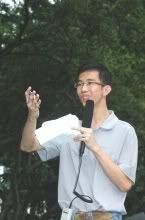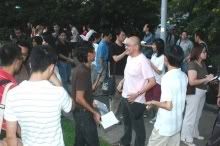Selene Cheng
 Following the news that public transport fares are to go up on Oct 1 this year, six bloggers spoke up against the fare hike at a one and a half hour forum at the Speakers’ Corner last Saturday. The event, which started at 5pm, attracted a crowd of about 150 people. Spotted amongst the crowd were notable figures like Nominated Member of Parliament Mr Siew Kum Hong, and former non-Constituency Member of Parliament Mr Steve Chia.
Following the news that public transport fares are to go up on Oct 1 this year, six bloggers spoke up against the fare hike at a one and a half hour forum at the Speakers’ Corner last Saturday. The event, which started at 5pm, attracted a crowd of about 150 people. Spotted amongst the crowd were notable figures like Nominated Member of Parliament Mr Siew Kum Hong, and former non-Constituency Member of Parliament Mr Steve Chia.
The six speakers were Mr Choo Zheng Xi, Chief Editor of The Online Citizen (TOC); Mr Leong Sze Hian, President of the Society of Financial Service Professionals; Mr Bernard Chen, Secretary of the Workers’ Party Youth Wing; Mr Goh Meng Seng, member of the National Solidarity Party; Dr James Gomez, member of the Workers’ Party; and Mr Gerald Giam, Deputy Editor at TOC.
The event kicked off with TOC’s Editor in Chief, Choo Zheng Xi, making a return to Speakers’ Corner after 8 years. He highlighted the glaring injustice that a company such as SMRT, which made $135m in 2007, is raising fares now which will affect the poor.
Leong Sze Hian: fine LTA as congestion increases
 Mr Leong, who spoke in English and Mandarin, questioned the figures and calculations used or given by the public transport authorities. Amongst other things, he highlighted the absence of a figure for the estimated profits of the two transport operators due to the increase, the income yardstick used by the transport companies to determine profitability, and the public transport companies’ return on total assets as compared to their counterparts elsewhere.
Mr Leong, who spoke in English and Mandarin, questioned the figures and calculations used or given by the public transport authorities. Amongst other things, he highlighted the absence of a figure for the estimated profits of the two transport operators due to the increase, the income yardstick used by the transport companies to determine profitability, and the public transport companies’ return on total assets as compared to their counterparts elsewhere.
Mr Leong suggested that the Land Transport Authority (LTA), which currently sees increasing Electronic Road Pricing (ERP) charges as a way to decrease congestion, be fined instead as the road gridlock worsens.
Bernard Chen: tertiary students deserve concession rates too
 Mr Chen gave observations and recommendations on the public transport system from the viewpoint of a student. He spoke about the unfairness in granting concession rates to primary to junior-college level students, but not to tertiary students, the current car license scheme, and questioned ERP’s current ability to control peak hour traffic.
Mr Chen gave observations and recommendations on the public transport system from the viewpoint of a student. He spoke about the unfairness in granting concession rates to primary to junior-college level students, but not to tertiary students, the current car license scheme, and questioned ERP’s current ability to control peak hour traffic.
He recommended revamping all fare conditions by allowing children not of school-going age to travel for free, and not base it according to height. He also suggested that all full-time students from age 7-25 enjoy “fair transport fare rates, concession or otherwise”.
Other suggestions Mr Chen gave was relooking the Road Traffic Act by increasing the legal age when a person can obtain a license to operate a motor vehicle from 18 to 21. “Public transportation should take precedence over private [car] ownership in the minds of youth today,” he said.
“Why are we encouraging them to take up a license at the age of 18?” he said.
He also recommended the formation of a public-private partnership between car-sharing companies and public transport companies for maximum route coverage. Lastly, he suggested that the Government provide tax relief for employers whose employees take alternative modes of transport to work
Goh Meng Seng: current economic and residential model not realistic in meeting public transport needs
 Mr Goh, who spoke in English and Mandarin, talked about how the current revenue-generation model of public transport companies and residential layout of housing estates worked against developing an effective transport system. He gave extensive comparisons with the Hong Kong public transport system, which he is familiar with as he has travelled there frequently .
Mr Goh, who spoke in English and Mandarin, talked about how the current revenue-generation model of public transport companies and residential layout of housing estates worked against developing an effective transport system. He gave extensive comparisons with the Hong Kong public transport system, which he is familiar with as he has travelled there frequently .
He explained that transport companies here, being a monopoly, saw no reason to earn revenue by courting advertisers’ dollars as they could easily increase fares. He suggested liberalising the transport sector by allowing free competition so that advertising could eventually become a potential revenue source.
Mr Goh also felt that the current residential layout of housing estates was partially to blame for the inadequate public transport coverage. He argued that residential areas here were too spread out, unlike in Hong Kong where there was heavy concentration of residential housing within the immediate vicinity of each train station, making the provision of adequate services here difficult and expensive.
James Gomez: immigration and workforce policy partly to blame for transport woes
 Dr Gomez gave a short speech on the meaning of “public transport”. As it serves large numbers of people – the public – its costs should be kept low but without sacrificing quality of service, he argued.
Dr Gomez gave a short speech on the meaning of “public transport”. As it serves large numbers of people – the public – its costs should be kept low but without sacrificing quality of service, he argued.
Dr Gomez also higlighted Singapore’s current immigration and workforce policy which has allowed an influx of foreigners, and suggested that the increase in volume has put a strain on Singapore’s public transport system.
Gerald Giam: more competition and accountability needed
Mr Giam’s speech covered some points from the public transport proposal released by TOC on 10 September. Among other things, he talked about how bus operators should be allowed to collect rent from retail outlets at bus interchanges, which are currently owned by LTA. This would allow bus operators to diversify their revenue sources, making it harder for them to justify fare increases. He also talked about how more competition should be introduced for public transport operators, through allowing private players into the market and dramatically shortening tender contract durations.
 Lastly, he spoke on increasing regulation on public transport companies to ensure compliance, and imposing fines of $100,000 or more when service standards are not meant. He also advocated increasing public accountability through making the Public Transport Council multi-partisan, with opposition members making up part of the group to ensure checks and balances.
Lastly, he spoke on increasing regulation on public transport companies to ensure compliance, and imposing fines of $100,000 or more when service standards are not meant. He also advocated increasing public accountability through making the Public Transport Council multi-partisan, with opposition members making up part of the group to ensure checks and balances.
A member of the public, James, felt that the points made by the speakers were valid. “After so many years, where’s the improvement [in our public transport system]?” he said. “We should not just be happy with the current standards. They’re having profits, so why [don’t they] put back the profits and improve it further?”
 Mr Siew felt that “on the whole the ministry is on the right track” as they were now putting people as the central consideration in the public transport system, such in their implementation of distance-based fares. However, he said that there was room to “reconsider and review the public transport companies and how their returns are being assessed right now”, as even during the off-peak period trains were crowded and infrequent, meaning that operators were maximising profits as they liked at the expense of the commuter.
Mr Siew felt that “on the whole the ministry is on the right track” as they were now putting people as the central consideration in the public transport system, such in their implementation of distance-based fares. However, he said that there was room to “reconsider and review the public transport companies and how their returns are being assessed right now”, as even during the off-peak period trains were crowded and infrequent, meaning that operators were maximising profits as they liked at the expense of the commuter.
The following quote from Mr Chen’s speech summarised the overall sentiment of the speakers at the Speakers’ Corner last Saturday.
“The transportation system must change and suit to fulfill the needs of every interest group as much as possible. But instead of being represented by public transport companies, we are being managed, and we, the people, have to change to meet the system.
This is wrong. The system must change to meet the people’s needs. Put “public” back into ‘public transportation’.”
Several members of the audience later suggested that TOC should hold such events regularly, one even suggesting that it be a monthly affair. However, the person in charge of organising Saturday’s event, Andrew Loh, says that he wants to take a rest first before even thinking of doing another one.
—————
Below is a short slideshow of what took place on Saturday. A video of ‘live’ scenes will be posted here on Tuesday.
